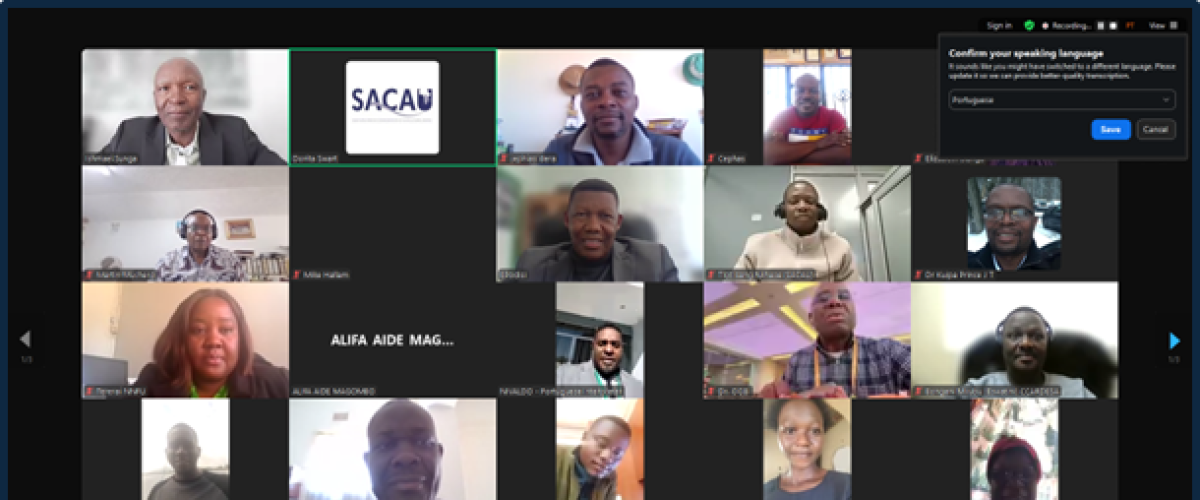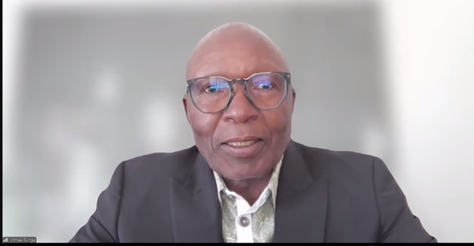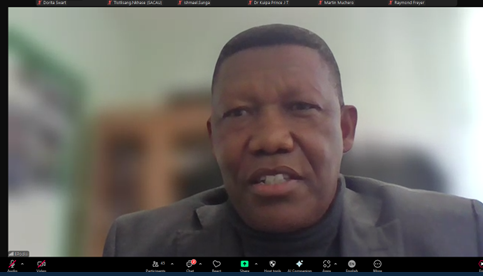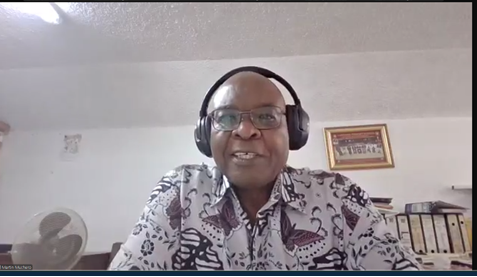
In a strong show of regional collaboration, the Centre for Coordination of Agricultural Research and Development for Southern Africa (CCARDESA) and the Southern African Confederation of Agricultural Unions (SACAU) jointly hosted a powerful webinar on the "Importance and Current Status of Agroecology R&D in Southern Africa." The insightful webinar, tilting towards research, youth engagement, and policy reform in agroecology, brought together researchers, policy experts, youth representatives, and farmers from across the SADC region for a robust discussion on the potential of agroecology to address soil health, climate resilience, and food sovereignty.
Opening the discussion, Dr. Ishmael Sunga, Executive Director of the Southern African Confederation of Agricultural Unions (SACAU), set the tone by highlighting a fundamental challenge in agricultural research and its disconnect from the realities of farming. “Researchers often research on farmers and not with farmers,” he observed, stressing that this imbalance limits the relevance and effectiveness of scientific findings. “Farmers may be polite, but they know when something doesn’t work for them. If we want to deliver impact, we must work with them from the outset—not just consult them after the fact,” he emphasized. His remarks echoed a growing call across the region for a more participatory approach to research and innovation that truly responds to farmers’ needs and realities. He also said that the webinar is meant to explore on what can be done to influence government to put more funds on what is important.

Dr. Baitsi Podisi, representing CCARDESA Executive Prof Cliff Dlamini, noted how CCARDESA has long supported sustainable agriculture and ecosystem-based approaches, tracing its involvement back to collaborations with the Research Institute of Organic Agriculture (FiBL) on organic farming. Today, CCARDESA continues to play a central role in various climate-relevant programs, including the Accelerating Impacts of CGIAR Climate Research for Africa (AICCRA), the Food Systems Resilience Program (FSRP), the Accelerating Climate Change Research in Africa (ACCRA), and the Comprehensive Africa Agriculture Development Programme Ex-Pillar 4 (CAADP-XP4). He also cited a recent EU-funded Research for Agroecology Network of Southern Africa (RAENS) Project to support agroecology research in the region that CCARDESA is coordinating. The technical implementation of the RAENS project has been assigned to the University of Cape Town-led Consortium and will primarily cover Malawi, South Africa, Tanzania, Zambia and Zimbabwe.
Dr. Podisi stressed the need to integrating agribusiness thinking, innovation, and digital tools that attract young minds to farming. He also emphasized that agroecology, though often described as a “new kid on the block,” is not a passing trend but a forward-looking approach that aligns closely with the region’s long-standing goals that are aligned to sustainable agriculture and climate adaptation. “Agroecology fits naturally into the ecosystem-based models that we have always advocated for. But to make it work, we must invest in research that speaks to farmers' real pay points and has to be shaped by their knowledge and experiences,” he stated.

International policy consultant Dr. Martin Muchero delivered a candid assessment of the policy and investment gaps hindering the advancement of agroecology in the region. “Across most countries, less than 1% of national GDP is allocated to agricultural research and development, and agroecology receives only a tiny slice of that,” he noted. He stressed that agroecology will remain on the margins without deliberate policy shifts and increased public funding despite its potential to build climate resilience and food sovereignty. Dr. Muchero called for national and regional policies prioritizing agroecological research within broader agricultural strategies. He pointed to Zimbabwe’s PFUMVUDZA Programme, which reached over a million farmers with its conservation agriculture interventions, as a successful example of how policy-backed initiatives can scale agroecological practices and deliver meaningful impact for farmers. He highlighted gaps that need to be addressed related to time-efficiency; labour intensity and the often neglectus social dimension.

Another Panelist, Michael Hallam, an organic fertilizer manufacturer based in Botswana, shared insights into the challenges and opportunities of growing a business in a field that remains underfunded and often overlooked. He indicated that their company managed to granulate their organic fertiliser into the same size and that of regular granular fertilisers. While noting that the company is still relatively small, he highlighted their recent expansion into Zimbabwe, demonstrating the growing demand for sustainable soil health solutions in the region. Hallam’s innovative work in developing organic fertilizers sparked considerable interest, including from Vola in Madagascar, who inquired about research findings on blending organic and chemical inputs. Responding to this, Dr. Martin Muchero emphasized the broader policy implications, stating, “Michael’s work is exactly the kind that deserves more funding and regional support.” His remarks underscored the importance of creating enabling policies that support the growth of homegrown agroecological enterprises and facilitate cross-border knowledge and technology exchange.
Representing young farmers, Elizabeth Sianga Maanda, aka Young Farmer, a passionate advocate for indigenous food systems, shared how CCARDESA’s training and meetings inspired her to champion seed sovereignty and soil health. “I grow local vegetables, use compost and mulch to feed the soil, and practice minimum tillage to preserve structure. This is more than farming, this is about preserving our future and a way of life,” she said. Elizabeth called for increased mentorship, financial access, and digital innovation to make agroecology more appealing to youth. “Organic produce fetches a higher price—we just need the markets, certification, and support systems,” she added.

Speakers from the SADC Region raised issues ranging from outdated fertilizer laws to soil degradation under monocropping. Dr Fred Msiska from Malawi asked for a cost-benefit analysis of agroecology across the region, questioning the long-term losses from underinvestment. Mr Sengeto from Eswatini noted research partnerships exploring agroecology's links to climate resilience, financial sustainability, and food sovereignty.
Mr Bongani Mvubu, raised a critical question during the webinar: “How do you maintain soil health under large-scale monocropping systems?” Drawing from local experiences, he explained how farmers in Eswatini are adopting integrated organic practices, such as combining goat manure and other natural inputs, to enhance soil fertility. However, he cautioned against the use of poultry manure and pig manure from feedlots, noting that they often contain toxic residues and heavy metals from commercial feed additives
Dr. Vimbayi Chimonyo from CGIAR observed that the transition is uneven while most farmers practice agroecology by default or design. “Agroecology must be context-specific. Done right, it bridges gaps between actors, farmers, value chains, finance, and policymakers,” she said.
As the webinar drew to a close, Dr Ishmael Sunga challenged stakeholders to “make agroecology sexy.” He urged practitioners to “walk the talk” and integrate agroecology into profitable, resilient systems that reward environmental stewardship. He further observed that some presentations on agroecology oozes signs of destitution where optimisation and agribusiness elements are glaringly lacking. He decried the limit focus on the power relations along the value chains given that the actors bearing the least risk are getting the higher returns while the farmers who are bearing the highest risk get the least returns besides bearing the social cost of caring for the environment. Dr Podisi explained this webinar is just the beginning of many more conversations to come to deliberate on a transition towards agroecology in the region,” he concluded.
Together, SACAU and CCARDESA called for a paradigm shift, one that moves away from top-down science toward collaborative, inclusive agricultural research and development. They emphasized the importance of engaging farmers as equal partners in the innovation process, ensuring that research is scientifically sound and context-specific, demand-driven, and responsive to the lived realities of farming communities. Such an approach, they argued, holds the potential to make agriculture more attractive, particularly to youth, and ultimately more transformative for the Southern African region.






